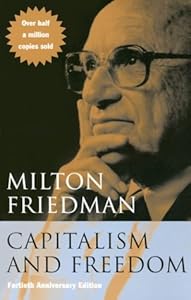In my quest to promote reading I came across a book several weeks ago, that I thought was quite extraordinary and quote controversial. "Capitalism and Freedom" was published in the 1960s and some describe it as the Bible of Economics. A little boring yes, but if you want a good "backdrop" to the current global economic crisis, then it is a must read.
In his 1962 book entitled "Capitalism and Freedom", Milton Friedman (July 31, 1912 – November 16, 2006) advocated policies such as a volunteer military, freely floating exchange rates, abolition of medical licenses, a negative income tax, and education vouchers. Some say he is the essence of the so called "Chicago school of conservative/libertarian economics", while others claim that he is the driving force behind former US President Ronald Reagan's supply side economics.
In his 1962 book entitled "Capitalism and Freedom", Milton Friedman (July 31, 1912 – November 16, 2006) advocated policies such as a volunteer military, freely floating exchange rates, abolition of medical licenses, a negative income tax, and education vouchers. Some say he is the essence of the so called "Chicago school of conservative/libertarian economics", while others claim that he is the driving force behind former US President Ronald Reagan's supply side economics.
The book was originally published in 1962 by the University of Chicago Press. It sold over 400,000 copies in the first 18 years and more than half a million since 1962. It has been translated into 18 languages.
The book is a compendium of all the things that governments should NOT be and should NOT be involved with, for the simple reason that they restrict individual freedom. Unfortunately several of the things he argues about have been dismantled since the 60s, while others have grown, and his theories on government regulation might sound a bit out of base in the light of the economic crisis we face in 2011. Nonetheless there is some logic in this book. It does not surprise me thereafter that the Times Literary Supplement chose it as one of the "hundred most influential books since the war (WWII)". A little dry yes, but nonetheless a worthwhile read.
Friedman was an American economist, statistician, academic, and author who taught at the University of Chicago for more than three decades. His books and essays were well read and were even circulated illegally in Communist countries.Most economists during the 1960s rejected Friedman's economic views, but since then they have had an increasing international influence. Some of his laissez-faire ideas concerning monetary policy, taxation, privatization and deregulation were used by governments, especially during the 1980s. A man with a huge intellect and education, but... little regard for human beings (that is totally my opinion).






